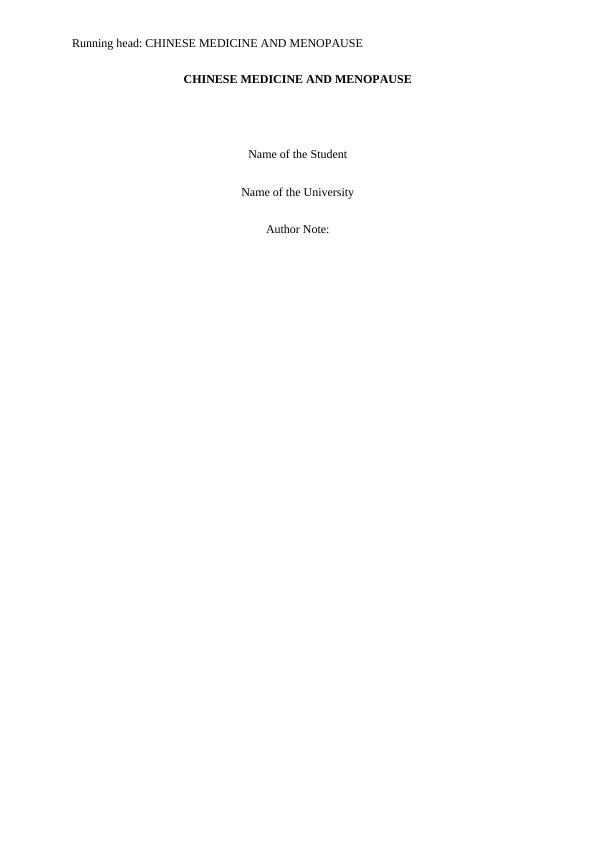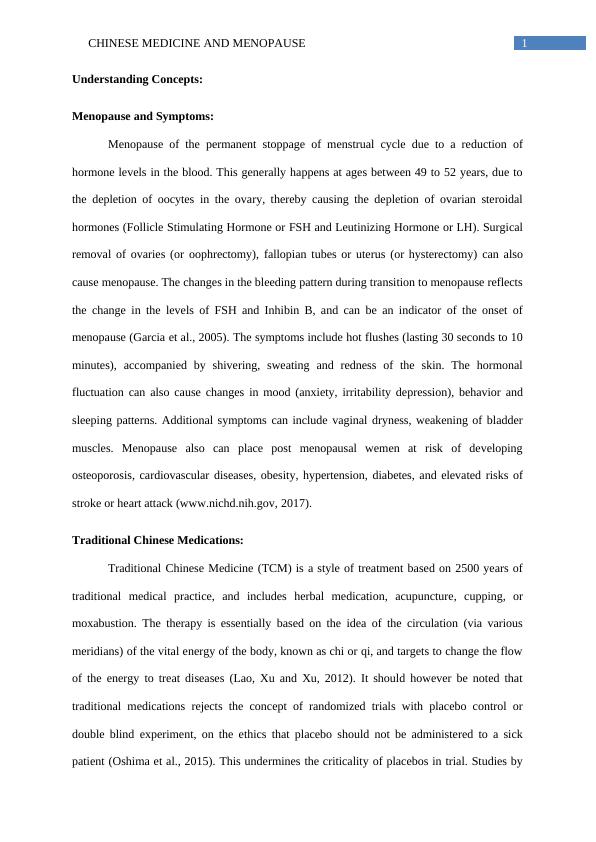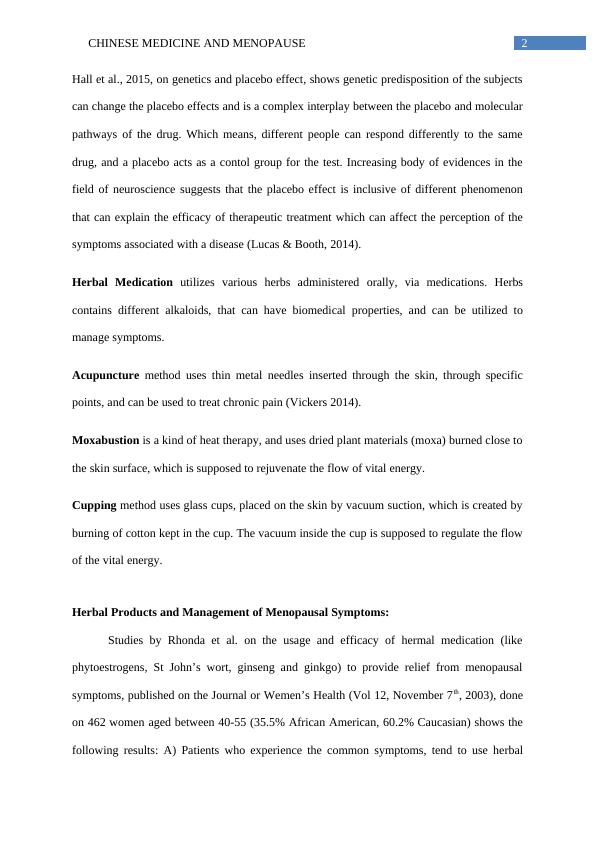Report on Chinese Medicine and Menopause
9 Pages2760 Words145 Views
Added on 2020-05-11
Report on Chinese Medicine and Menopause
Added on 2020-05-11
ShareRelated Documents
Running head: CHINESE MEDICINE AND MENOPAUSECHINESE MEDICINE AND MENOPAUSEName of the StudentName of the UniversityAuthor Note:

1CHINESE MEDICINE AND MENOPAUSEUnderstanding Concepts:Menopause and Symptoms:Menopause of the permanent stoppage of menstrual cycle due to a reduction ofhormone levels in the blood. This generally happens at ages between 49 to 52 years, due tothe depletion of oocytes in the ovary, thereby causing the depletion of ovarian steroidalhormones (Follicle Stimulating Hormone or FSH and Leutinizing Hormone or LH). Surgicalremoval of ovaries (or oophrectomy), fallopian tubes or uterus (or hysterectomy) can alsocause menopause. The changes in the bleeding pattern during transition to menopause reflectsthe change in the levels of FSH and Inhibin B, and can be an indicator of the onset ofmenopause (Garcia et al., 2005). The symptoms include hot flushes (lasting 30 seconds to 10minutes), accompanied by shivering, sweating and redness of the skin. The hormonalfluctuation can also cause changes in mood (anxiety, irritability depression), behavior andsleeping patterns. Additional symptoms can include vaginal dryness, weakening of bladdermuscles. Menopause also can place post menopausal wemen at risk of developingosteoporosis, cardiovascular diseases, obesity, hypertension, diabetes, and elevated risks ofstroke or heart attack (www.nichd.nih.gov, 2017).Traditional Chinese Medications:Traditional Chinese Medicine (TCM) is a style of treatment based on 2500 years oftraditional medical practice, and includes herbal medication, acupuncture, cupping, ormoxabustion. The therapy is essentially based on the idea of the circulation (via variousmeridians) of the vital energy of the body, known as chi or qi, and targets to change the flowof the energy to treat diseases (Lao, Xu and Xu, 2012). It should however be noted thattraditional medications rejects the concept of randomized trials with placebo control ordouble blind experiment, on the ethics that placebo should not be administered to a sickpatient (Oshima et al., 2015). This undermines the criticality of placebos in trial. Studies by

2CHINESE MEDICINE AND MENOPAUSEHall et al., 2015, on genetics and placebo effect, shows genetic predisposition of the subjectscan change the placebo effects and is a complex interplay between the placebo and molecularpathways of the drug. Which means, different people can respond differently to the samedrug, and a placebo acts as a contol group for the test. Increasing body of evidences in thefield of neuroscience suggests that the placebo effect is inclusive of different phenomenonthat can explain the efficacy of therapeutic treatment which can affect the perception of thesymptoms associated with a disease (Lucas & Booth, 2014).Herbal Medication utilizes various herbsadministered orally, via medications. Herbscontains different alkaloids, that can have biomedical properties, and can be utilized tomanage symptoms.Acupuncture method uses thin metal needles inserted through the skin, through specificpoints, and can be used to treat chronic pain (Vickers 2014). Moxabustion is a kind of heat therapy, and uses dried plant materials (moxa) burned close tothe skin surface, which is supposed to rejuvenate the flow of vital energy.Cupping method uses glass cups, placed on the skin by vacuum suction, which is created byburning of cotton kept in the cup. The vacuum inside the cup is supposed to regulate the flowof the vital energy.Herbal Products and Management of Menopausal Symptoms:Studies by Rhonda et al. on the usage and efficacy of hermal medication (likephytoestrogens, St John’s wort, ginseng and ginkgo) to provide relief from menopausalsymptoms, published on the Journal or Wemen’s Health (Vol 12, November 7th, 2003), doneon 462 women aged between 40-55 (35.5% African American, 60.2% Caucasian) shows thefollowing results: A) Patients who experience the common symptoms, tend to use herbal

End of preview
Want to access all the pages? Upload your documents or become a member.
Related Documents
Polycystic Ovary Syndrome (PCOS).lg...
|16
|1247
|13
